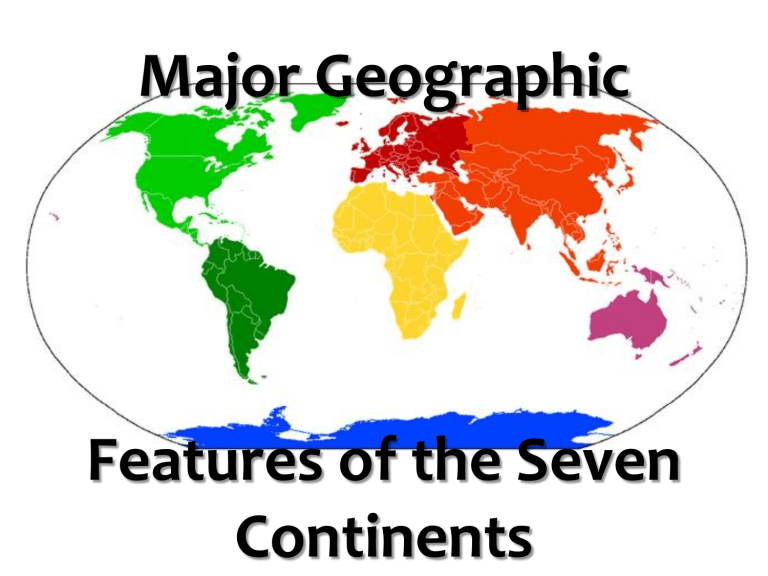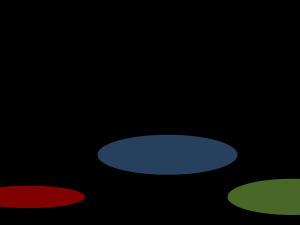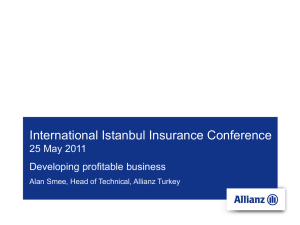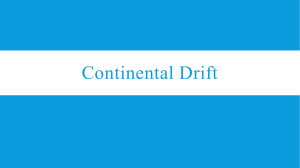Major Geographic Features of the Seven Continents

Major Geographic
Features of the Seven
Continents
Social Studies for Sixth Grade
This lesson will be about major geographical features on all seven of the continents. The students will know about and be able to identify the seven continents and various major geographic features the continents are known for.
In the following slide the students can click on any of the seven continents and it will display a map of the continent and the geographic locations they will need to be able to identify. They can then click on those locations for further information about the region.
There will be a short quiz at the end of the presentation.
CLICK ON ONE OF THE EARTHS SEVEN
CONTINENTS…
CLICK HERE TO TAKE A SHORT QUIZ WHEN YOU ARE FINISHED
Locate and click on the links for the following locations :
CLICK HERE TO RETURN TO THE SEVEN CONTINENTS
Alaska Range
Mountains that are located in south-central Alaska. The highest peak in North
America is located here, Mt. McKinley at 20,320 feet.
CLICK HERE TO RETURN TO NORTH AMERICA
The Rocky Mountains
The mountains are 3,000 miles in length and extend all the way from the U.S. state of New Mexico all the way up through the western part of the United States clear into the northernmost part of Canada’s British Columbia.
CLICK HERE TO RETURN TO NORTH AMERICA
Appalachian Mountains
About 1,500 miles in length expanding from the center of the U.S. state of
Alabama through the eastern part of the U.S. all the way into the Canadian provinces of Newfoundland, New Brunswick, and Quebec.
CLICK HERE TO RETURN TO NORTH AMERICA
The Great Lakes
The largest lake group in the world contains five fresh water lakes. Lake Huron,
Ontario, Michigan, Erie, and Superior cover an are of 95,000 square miles.
CLICK HERE TO RETURN TO NORTH AMERICA
CLICK HERE TO RETURN TO NORTH AMERICA
Mississippi/ Missouri Rivers
The Mississippi is the major river in North America and is 2,339 miles in length. The river runs from northwestern Minnesota all the way to the Gulf of
Mexico, just below New Orleans.
The Missouri is the longest river in the United States with a length of 2,500 miles. The river runs from southern Montana in the Rocky Mountains to the state of Missouri where it meets the Mississippi River.
Rio Grande River
The river runs from southern Colorado southeast to the Gulf of
Mexico and forms the natural border between
Texas and Mexico.
CLICK HERE TO
RETURN TO
NORTH AMERICA
St. Lawrence River
One of the most important shipping routes in the world, the St. Lawrence connects the Atlantic Ocean and the Great Lakes. It contains man-made canals to allow the deep-water ships passage.
CLICK HERE TO RETURN TO NORTH AMERICA
Locate and click on the links for the following locations:
CLICK HERE TO
RETURN TO
MAP OF THE
SEVEN
CONTINENTS
The Andes Mountains
The Andes Mountains are 4,500 miles in length, spanning the entire western coast of South America. Some of the earths largest volcanoes are located in the Andes.
CLICK HERE TO RETURN TO SOUTH AMERICA
Amazon Basin
This region is covered by the largest tropical rain forest in the world and covers 1/3 of South America. The Amazon River and its more than 1,000 tributaries run throughout the area.
CLICK HERE TO RETURN TO SOUTH AMERICA
LOCATE AND CLICK ON
THE LINKS OF THE
FOLLOWING LOCATIONS:
CLICK HERE TO RETURN TO THE MAP OF THE SEVEN CONTINENTS
Ural Mountains
The Ural Mountains form the natural border between Europe and Asia.
CLICK HERE TO RETURN TO EUROPE
Alps
The Alps are known for glaciers, lakes, valleys, and the best skiing conditions in the world. The Alps are source of many major rivers of the region including the Danube
River.
CLICK HERE TO RETURN TO EUROPE
Balkan Mountains
The Balkan Mountains are most famous for Mt. Olympus, the highest peak in all of Greece. It was the mythical home for the Greek God
Zeus in ancient times.
CLICK HERE TO RETURN TO EUROPE
The planet’s largest continent covers 30% of the Earth’s surface and has 3 political divisions;
CLICK HERE TO RETURN TO SEVEN CONTINENTS
Locate the
Euphrates, Tigris, and Indus Rivers.
Mt. Everest, the world’s tallest mountain, is located in the Himalayan
Mounains in Southeast Asia. Mt. Everest is 29,035 feet tall.
North Asia is where the world’s largest country, Russia, and the world’s most populated country, China, are located.
Locate and click on the links for the following locations:
CLICK HERE TO RETURN TO THE SEVEN CONTINENTS
The Sahara Desert
The Sahara covers almost 1/3 of Africa and is the largest desert in the world being approximately 3.5 million square miles in size.
CLICK HERE TO RETURN TO AFRICA
The Kalahari Desert
The desert is located at the southern tip of Africa.
CLICK HERE TO RETURN TO AFRICA
Congo River Basin
The Congo River Basin is about 1.4 square miles in size and almost 20% of the world’s rain forest is located there. The Congo River, pictured below, is the second longest river in Africa.
CLICK HERE TO RETURN TO AFRICA
The Nile River
The longest river in the world at about 4,160 miles in length and consists of dams, rapids, streams, swamps, tributaries, and waterfalls.
CLICK HERE TO RETURN TO AFRICA
Locate and click on the links for the following locations:
CLICK HERE TO RETURN TO THE SEVEN CONTINENTS
Australia
The continent of
Oceania used to be called Australia but the name was changed to refer to Australia, New
Zealand, Papua New
Guinea, and thousands of islands. It is the largest country in
Oceania and known for its Great Barrier Reef, pictured here.
Micronesia
Also known as the small islands. (remember: micro means small)
CLICK HERE TO RETURN TO OCEANIA
Melanesia
Pictured here is the independent country of Vanuatu located in Melanesia.
CLICK HERE TO RETURN TO OCEANIA
Polynesia
Also known as many islands.
(remember: “Poly” means many)
Pictured here is
Bora Bora part of the French
Polynesia.
CLICK HERE TO RETURN TO OCEANIA
Antarctica
The continent is almost 98% solid ice and is the coldest, windiest spot on the planet. Officially the population is none but tourists visit the region and governmental research stations exist there.
Be able to locate the South
Pole and the Antarctic Circle.
• The Antarctic Circle marks the northern limit of the area where one day or more each year the sun does not set or rise.
• The South Pole is the most southern point on the Earth’s surface and where Earth rotates on its axis.
CLICK ON YOUR ANSWERS FOR THE FOLLOWING QUESTIONS
1. The Rocky and Appalachian Mountains are found on which continent.
b.
c.
d.
2. The Ural Mountains form the Natural border between which two continents.
North America and South America
3. The southern most point of the Earth is located in which continent.
b.
c.
d.
4. Mt. Everest, the world’s tallest mountain is located in which continent.
b.
c.
Click here when you are finished answering the questions
GREAT JOB!!!!!
You Were Correct!
CLICK HERE TO ANSWER THE NEXT QUESTION
The correct answer is North America.
CLICK HERE TO ANSWER THE NEXT QUESTION
The correct answer is Europe and Asia
CLICK HERE TO ANSWER THE NEXT QUESTION
The correct answer is Antarctica.
CLICK HERE TO ANSWER THE NEXT QUESTION
The correct answer is Asia
CLICK HERE
Works Cited www.worldatlas.com
http://image.guardian.co.uk/sys-images/Arts/Arts_/Pictures/2007/08/06/mountmckinley460.jpg
http://www.marietta.edu/~biol/biomes/images/alpine/mtopview.jpg
http://www.wildearthguardians.org/Portals/0/images/photo_Rocky_Mountains_900x300.jpg
http://www.coastwatch.msu.edu/images/GreatLakes1.jpg
http://www.uplandtales.org/wp-content/uploads/2009/02/river.jpg
http://anquetil.colorado.edu/~arlowry/RGR/riogrande.jpg
http://www.fhwa.dot.gov/hfl/images/ralls_46.jpg
http://volcanoes.usgs.gov/Imgs/Jpg/Ruiz/30410135_061_large.jpg
http://www.coolmelbourne.org/images/amazon-river-brazil-rainforest.jpg
http://www.historyforkids.org/scienceforkids/geology/platetectonics/pictures/urals.jpg
http://citypictures.org/r-europe-148-france-218-alps-france-2493.htm
http://www.toursonline.org/wp-content/uploads/2008/03/mount_olympus_3.jpg
http://www.asiatravel.com.np/uploads/gallery/Nepal/MountEverest.jpg
http://www.mccullagh.org/db9/1ds-4/sahara-desert-sand-dune.jpg
http://www.humanitysteam.org/files/547436.jpg
http://www.internationalrivers.org/files/images/CongoNasa.jpg
http://lucialai.org/wp-content/uploads/2009/09/egypt_river_nile.jpg
http://www.airah.org.au/AM/Images/Conferene_files/GBReef.jpg
http://www.newisraelblog.org/wp-content/uploads/2010/03/Micronesia.jpg
http://www.dorlingkindersleyuk.co.uk/static/html/features/where_to_go/images/06june/02_vanatu.jpg
http://www.dorlingkindersleyuk.co.uk/static/html/features/where_to_go/images/06june/02_vanatu.jpg








